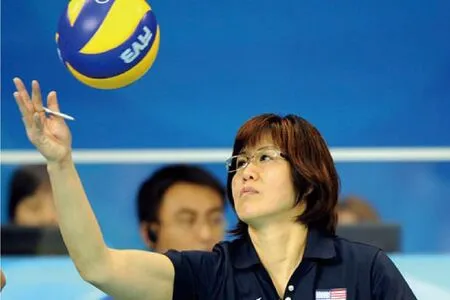Does Winning or Losing Really Count in Sports?
2017-09-03ByLangPing
By Lang Ping
Does Winning or Losing Really Count in Sports?
By Lang Ping
It seems that the life of an athlete is all about two words—“winning” and “losing.” Whenever I see my friends, they never ask about my life, or my physical condition; instead, they say something like, “Hey! You seem to be doing well lately. You won another match!” or “When do you think you can ace out the Cuban team and take the crown?”
Media reports also seem to echo this sentiment—“When will you take another win, Lang Ping?”
I feel dizzy when I hear such greetings, especially during those days when I had just come back to China from the United States. Maybe I was influenced by American culture, so I didn’t concern myself with success or failure.
In American people’s minds, as long as you give it your best shot, you shouldn’t worry about the results it brings—regardless of winning or losing—as success is determined by many factors, such as your attitude and capability.
But in China, we are in the habit of pursuing a single goal: to win, to take the crown, and to be invincible. As a youth, my life was all about volleyball. If I didn’t play well, the brilliance and meaning of my life would be gone; therefore, I was under tremendous mental stress to win. Whenever I lost a game, a huge question mark would fl ash into my mind: How am I supposed to face my supporters?

Lang Ping (born on December 10th, 1960), nicknamed as“Iron Hammer” for her powerful smashing skill, is a former Chinese volleyball player and the former head coach of the United States women’s national volleyball team and the current head coach of China women’s national volleyball team, herself being the MVP of women volleyball in 1984 Olympics.

While living in the United States, my volleyball coach, Raul, and I always confided in each other. Raul said, “There is only one world champion, but life is not all about winning. Playing volleyball is a career that we love, so we should try to get more fun from it, instead of feeling under pressure all the time. People vary in terms of their capabilities, for example, some people can carry a load of 20 kilograms easily, but to you, 15 kilograms is the limit. So, if you can carry a load of 15 kilograms, then you are a winner.”
When I was the assistant coach to Raul at the University of New Mexico, it seemed like the only thing I ever said was, “No, that’s the wrong way to do it.” Whatever the players did, I would say “No.” However, Raul took a completely different approach; she always said things like, “Great. It’s a good move, but practice it more and have it thoroughly mastered,” or“Well, it doesn’t seem good enough. Please try it again. You can do better.”
Her manner had a positive effect, which helped to cultivate a person’s self-respect and self-confidence. At first, I wasn’t used to it myself. Whenever I received compliments, I replied modestly, “No, I am not a good player.” Other people wouldn’t understand, so they asked, “You’re the world champion. If you are not a good player, then who is?” I turned speechless.
The reason why our team could win was due to the fact that we didn’t give up in the face of difficulties. Champions are not necessarily those who fought hard, and those who lost a game might still have tried their best. In fact, winning is not the only thing that matters—it is the human spirit that we play for.
In the 1984 Los Angeles Olympic Games, though the US women’s national volleyball team failed to take the crown, they were an excellent and impressive team; thus, the American audience’s reaction towards their loss in the finals was, “No worries. We’ll try again next time.”
Flo Hyman has devoted all her life in playing volleyball. Though her team never won a championship, her statue was still erected in the United States Olympic Training Center, and US President Ronald Reagan also called upon America to learn from the spirit of the US women’s national volleyball team. Such an attitude towards success and failure, as I see it, re fl ects a nation’s mentality.
Many people are sensitive about winning or losing, but they may not understand its true meaning—that is, God will never pity those who care too much about gains and losses. Never give in to hardship, have full confidence in “staying alive,” and make every effort to “survive”—the meaning and value of such a quality outweighs winning and losing.
(From The Passionate Years: Lang Ping’s Biography, Orient Publishing Center. Translation: Zhu Yaguang)

